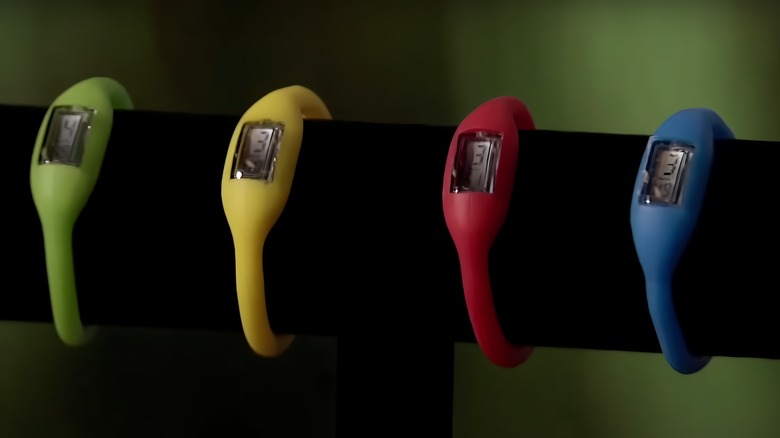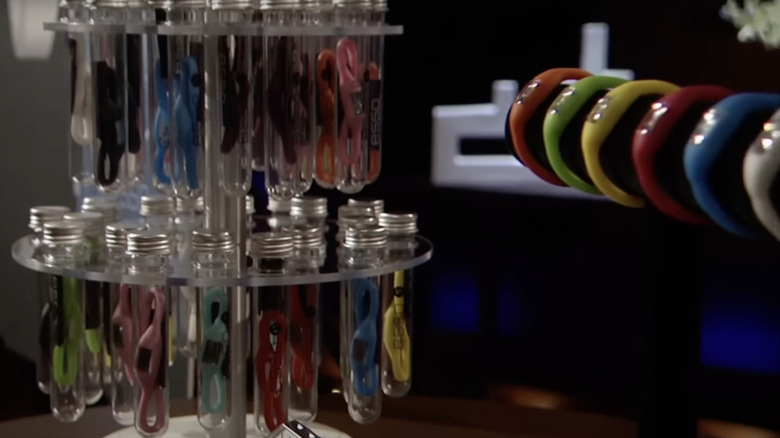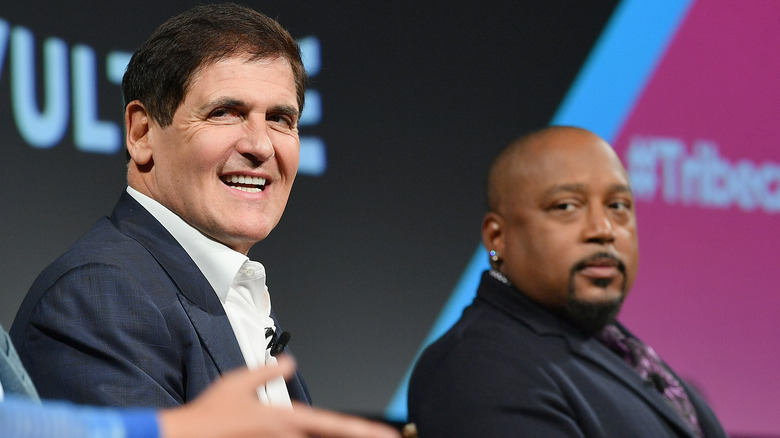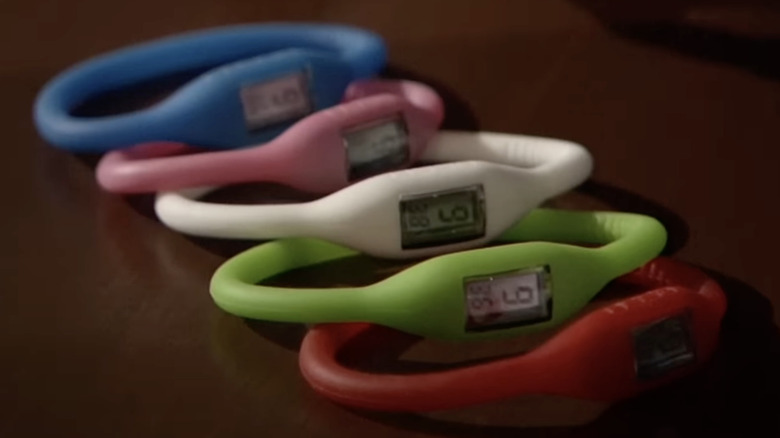Where Is Esso Watches From Shark Tank Season 13 Today?
Ryan Naylor's pitch for his wellness accessory, Esso Watches, was a memorable moment in "Shark Tank" history. What made the episode so unforgettable, however, wasn't that Naylor knocked the pitch out of the park, but because the sharks essentially ate the entrepreneur alive, so to speak.
Illustrating the watch's function using an accompanying infographic, Naylor explained that the technology uses negative ions, which are fused into the watch's silicone, to counteract the added pressure placed on our bodies caused by everyday exposure to positive ions from our electronics (via CNBC Prime). Naylor stated that the watch would restore the body's natural energy balance and was asking for a $35,000 investment for 20% of the company. Right out the gate, however, it was clear the sharks had their reservations.
Then, in a moment that Lori Greiner described as "a little weird," she demonstrated improved balance while wearing the watch and standing on one foot with her arms outstretched. She maintained this balance even as Naylor pushed down on one of her arms. While this may have prompted some of the judges to second-guess their initial judgments of the product, Kevin O'Leary was not convinced.
How Esso Watches was received on Shark Tank
Being among the first of the judges to openly voice their reluctance, O'Leary immediately likened Esso Watches to that of a coffee enema, calling into question whether this notion of ion imbalance was truly a credible health concern (via CNBC Prime). Mark Cuban promptly followed suit as he declined to take Naylor's complimentary Esso Watch gift, adding that he was "allergic to scams." Citing the placebo effect as the reason for Greiner's improved balance, Cuban argued that the imbalance of positive and negative ions was a concept that had long been debunked.
Further questioning the science behind the product, Greiner asked if the company had conducted any independent scientific testing to back up their claims, to which Naylor replied they had not. Deeming it a "liability nightmare," Greiner bowed out. But the sharks weren't done yet. Naylor was then accused by Daymond John of copying the watch designs of John's own company RumbaTime. While O'Leary took a moment to consider whether there may be any potential money-making opportunities with the product, he ultimately tapped out along with the rest of the judges, leaving Naylor to walk away with no deal.
In the aftermath of Shark Tank
In the years following his 2012 appearance on "Shark Tank," Naylor has opened up about where the concept for Esso Watches originated from and the lessons learned from his time on the show. In 2015, Naylor was a speaker at Phoenix Startup Week where he spoke about his experience traveling through Europe and how he had noticed the popularity of a similar accessory being worn in Italy at the time (per GeekWire). Looking to bring the idea to the United States, Esso Watches was born and began successfully selling its product.
Although Naylor exited "Shark Tank" without any investment money, he instead departed with a valuable realization. In the episode, upon leaving the stage, the sharks noted how Naylor failed to fight for his vision. In his 2015 speech, Naylor agreed that his passion for Esso Watches was absent. "I didn't even care to defend myself," he said, per GeekWire reporting. "I didn't even care to defend the technology. ... I realized I didn't have a passion for it. I decided to come back from that experience to find something I was really passionate about."
Is Esso Watches still in business?
In light of Naylor's realization, Esso Watches is no longer in business today. Nor could it be, seeing as shortly after his time on "Shark Tank" the entrepreneur closed up shop after settling with Exxon Mobile over copyright infringement issues of the name "Esso" (via GeekWire). In a 2021 interview on an episode of the "We Live to Build" Podcast, Naylor shared that the lawsuit had ultimately been the final straw for him and his family after enduring online harassment from viewers following the airing of his episode.
But that wasn't the end of Ryan Naylor's story. Rather, he pivoted from the health and wellness space to what he described in the podcast interview as more customer-centric endeavors — specifically, job-seekers. Keeping true to his entrepreneurial roots, Naylor went on to form LocalWork.com, where people seeking employment in Arizona could search for jobs they're most passionate about. Helping secure employment for more than 100,000 locals, the company operated for five years. Naturally, much of the content is now currently outdated, although the website remains active. Since then, Naylor has gone on to develop yet another new venture.
What Ryan Naylor is focused on today
Most recently, Naylor created VIVAHR, a recruiting software that allows small businesses to post their hiring notices to more than 50 job boards simultaneously. Not only that, but the software also supports adding photos and videos to job postings so that businesses can paint a picture of the work environment for applicants. Naylor explained on the "We Build to Live" podcast that the platform gives small-business owners access to the same hiring and recruiting opportunities as larger companies while still keeping costs low. The company, as well as Naylor, remains active on social media.
Through the ups and the downs, it's clear that Ryan Naylor has finally found the passion he was searching for. Knowing what he knows now, might he consider returning to the "Shark Tank" stage one day? As reported by GeekWire, the question was posed to the entrepreneur during his 2015 speech at Phoenix Startup Week, to which he said: "In a heartbeat. But I would take what I learned and not just talk about numbers and opportunities. I would make sure my product and messaging is completely aligned with my passion and goals."





